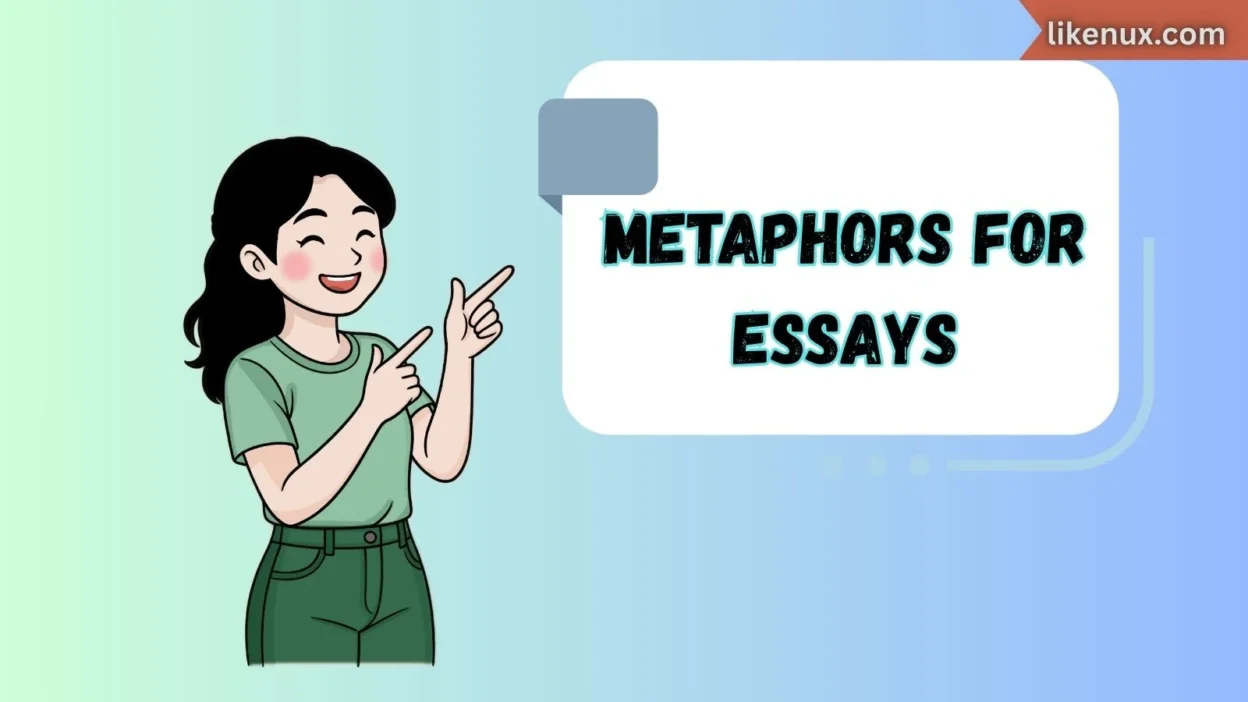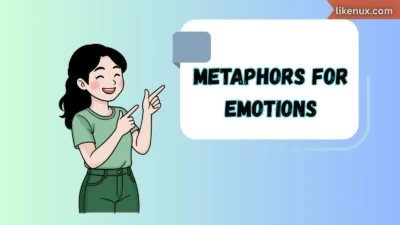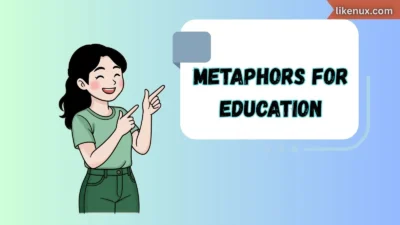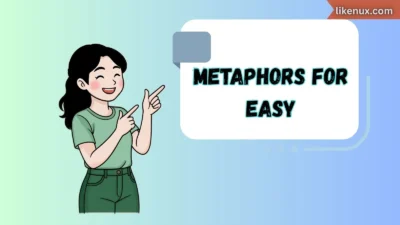Writing an essay can sometimes feel like stepping into an unexplored forest — full of ideas waiting to be found, shaped, and shared. Whether you’re a student, teacher, or content writer, understanding and using metaphors in essays can transform your writing from simple to stunning.
Metaphors make your essays alive, meaningful, and memorable. They bridge the gap between abstract thoughts and vivid imagery, helping readers feel what you mean instead of just reading it. In this guide, I’ll share 25 powerful metaphors for essays that will not only make your writing shine but also help you express your ideas with warmth and confidence.
Each metaphor below includes its meaning, a sentence example, best use, and other ways to say it — all designed to enhance your writing naturally.
1. An Essay is a Journey
Meaning: Writing is like traveling from one idea to another.
In a Sentence: “My essay felt like a journey through my own thoughts.”
Best Use: Great for introductions that reflect personal growth or exploration.
Other Ways to Say: A path, an adventure, or a road trip.
2. An Essay is a Mirror
Meaning: It reflects the writer’s inner thoughts and beliefs.
In a Sentence: “This essay became a mirror of my learning experience.”
Best Use: Ideal for reflective or personal essays.
Other Ways to Say: Reflection, self-portrait, window into the mind.
3. An Essay is a Puzzle
Meaning: Each paragraph fits together to form a complete picture.
In a Sentence: “Every argument in my essay was a piece of a larger puzzle.”
Best Use: Analytical or argumentative essays.
Other Ways to Say: Mosaic, pattern, or framework.
4. An Essay is a Conversation
Meaning: It’s an exchange between the writer and reader.
In a Sentence: “My essay speaks directly to the reader like a conversation.”
Best Use: Opinion or persuasive essays.
Other Ways to Say: Dialogue, discussion, or exchange.
5. An Essay is a Recipe
Meaning: It needs the right ingredients — structure, tone, and logic.
In a Sentence: “Writing an essay is like following a recipe for clarity.”
Best Use: Teaching essay structure or composition.
Other Ways to Say: Formula, blueprint, or method.
6. An Essay is a Bridge
Meaning: It connects ideas and perspectives.
In a Sentence: “My essay serves as a bridge between theory and practice.”
Best Use: Comparative or cross-disciplinary writing.
Other Ways to Say: Link, connection, or pathway.
7. An Essay is a Garden
Meaning: Ideas grow when cared for and arranged thoughtfully.
In a Sentence: “Each paragraph blooms like a flower in my essay.”
Best Use: Creative writing or literary analysis.
Other Ways to Say: Orchard, field, or landscape.
8. An Essay is a Map
Meaning: It guides readers through complex ideas.
In a Sentence: “The introduction is the map that helps readers find direction.”
Best Use: Informative or structured essays.
Other Ways to Say: Guide, route, or layout.
9. An Essay is a Building
Meaning: Every paragraph is a block that supports the structure.
In a Sentence: “My essay’s thesis is the foundation of the entire structure.”
Best Use: Academic and research writing.
Other Ways to Say: Structure, framework, or construction.
10. An Essay is a Symphony
Meaning: All parts work together harmoniously.
In a Sentence: “My essay’s tone and arguments blend like instruments in a symphony.”
Best Use: Essays requiring balance in ideas or tone.
Other Ways to Say: Harmony, rhythm, or composition.
11. An Essay is a Battle
Meaning: Each argument defends a central idea.
In a Sentence: “My essay fought to prove the importance of equality.”
Best Use: Argumentative or persuasive writing.
Other Ways to Say: Debate, struggle, or defense.
12. An Essay is a Painting
Meaning: Words paint images that stay in the reader’s mind.
In a Sentence: “I used vivid imagery to paint emotions across my essay.”
Best Use: Descriptive and narrative essays.
Other Ways to Say: Artwork, illustration, or portrait.
13. An Essay is a Lighthouse
Meaning: It guides readers toward understanding.
In a Sentence: “My essay acts as a lighthouse for readers lost in confusion.”
Best Use: Essays clarifying complex concepts.
Other Ways to Say: Beacon, guidepost, or signal.
14. An Essay is a Dance
Meaning: Ideas flow gracefully when rhythm and timing are right.
In a Sentence: “The transitions in my essay move like steps in a dance.”
Best Use: Creative or stylistic writing.
Other Ways to Say: Flow, movement, or rhythm.
15. An Essay is a Seed
Meaning: One idea can grow into a field of insights.
In a Sentence: “My essay started as a seed of curiosity that grew into knowledge.”
Best Use: Exploratory essays or research topics.
Other Ways to Say: Germ, beginning, or origin.
16. An Essay is a Tapestry
Meaning: Different threads of thought weave a complete design.
In a Sentence: “Each section of my essay is a thread in a colorful tapestry.”
Best Use: Essays combining multiple perspectives.
Other Ways to Say: Fabric, weave, or pattern.
17. An Essay is a Fire
Meaning: It can ignite passion and spark change.
In a Sentence: “My essay burns with the desire for social justice.”
Best Use: Persuasive or advocacy essays.
Other Ways to Say: Flame, spark, or ignition.
18. An Essay is a Mirror of Society
Meaning: It reflects the world and its realities.
In a Sentence: “This essay mirrors our generation’s struggle for balance.”
Best Use: Sociological or cultural essays.
Other Ways to Say: Reflection, lens, or depiction.
19. An Essay is a Tool
Meaning: It helps analyze, question, or build knowledge.
In a Sentence: “An essay is a tool to sharpen our understanding.”
Best Use: Educational and academic writing.
Other Ways to Say: Instrument, means, or mechanism.
20. An Essay is a Story
Meaning: It carries a beginning, middle, and end with purpose.
In a Sentence: “I shaped my essay like a story that leads to discovery.”
Best Use: Personal or narrative essays.
Other Ways to Say: Tale, narrative, or chronicle.
21. An Essay is a Canvas
Meaning: The writer paints thoughts freely with words.
In a Sentence: “This essay became my canvas for creativity.”
Best Use: Creative and expressive writing.
Other Ways to Say: Platform, page, or surface.
22. An Essay is a Lighthouse of Thought
Meaning: It shines light on hidden or ignored ideas.
In a Sentence: “My essay became a lighthouse for underrepresented voices.”
Best Use: Advocacy or opinion essays.
Other Ways to Say: Beacon of awareness, torch of truth.
23. An Essay is a Machine
Meaning: It functions efficiently when all parts work together.
In a Sentence: “Each paragraph in my essay keeps the machine running smoothly.”
Best Use: Technical or analytical essays.
Other Ways to Say: System, engine, or mechanism.
24. An Essay is a Bridge of Understanding
Meaning: It connects the writer’s mind with the reader’s.
In a Sentence: “My essay acts as a bridge between two generations.”
Best Use: Cross-cultural or comparative essays.
Other Ways to Say: Link, bond, or connector.
25. An Essay is a Compass
Meaning: It gives direction to ideas and thought processes.
In a Sentence: “The thesis statement is the compass of my essay.”
Best Use: Academic and reflective writing.
Other Ways to Say: Guide, navigator, or pointer.
Conclusion
Using metaphors in essays isn’t just about style — it’s about connection. Metaphors help you communicate deeply, guide readers, and make your writing memorable. As someone who has written and graded hundreds of essays, I’ve seen how a well-placed metaphor can turn average writing into something truly inspiring.
So next time you start an essay, think beyond facts and figures. Let your words breathe life into your ideas — and your writing will naturally stand out.
FAQs
1. Why are metaphors important in essays?
Metaphors make essays more engaging, emotional, and relatable for readers. They help express complex ideas simply.
2. Can metaphors make academic essays stronger?
Yes, when used correctly, metaphors can clarify complex topics and make arguments more persuasive.
3. How many metaphors should I use in an essay?
Use them sparingly — one or two powerful metaphors per essay is usually enough.
4. Are metaphors acceptable in formal writing?
Absolutely. Just ensure they fit the tone and context of your essay.
5. How can I create my own metaphors?
Think about how your topic feels or behaves and connect it to something familiar — that’s the essence of a good metaphor.

Andrew Christopher is a passionate visionary who blends creativity with purpose to bring ideas to life. With a focus on innovation and integrity, he inspires growth and lasting impact.



